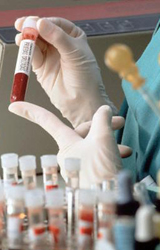Premarital Screening By:Dr. Hana Fakhoury
What is the premarital screening program in KSA?
Genetic disorders and in particular hemoglobinopathies such as
sickle cell anemia and thalassemia are common in Saudi Arabia, particularly in the Eastern and Southern regions.
In 2004, the Saudi Ministry of Health implemented a mandatory premarital screening program in order to decrease the incidence of these genetic disorders in future generations. This program was named “premarital medical test”.
In 2008, this test was updated to include mandatory screening for hepatitis B and C viruses and Human Immunodeficiency virus (HIV). The new updated program was given the name of “Program of healthy marriage”.
How is the test performed?
This test is carried out at designated Marriage Consultation Centers, by doing simple blood tests. The blood taken from the couple is used to do the following tests: complete blood count (CBC), sickle cell test, hemoglobin electrophoresis; in addition to screening for HIV, Hepatitis B and C viruses. The couple has to fill in a premarital form with data including name, age, gender, national number, address, and telephone number.
When is the best time to do the test?
Prospective couples are encouraged to do the test as early as possible, to avoid disappointment in case the results turn out to be unsatisfactory.
So before you start planning for your wedding, you should check the results of your premarital test.
Do I need to be fasting for the blood test?
No, no need to be fasting.
What will the result reveal?
-
If the person is affected with or is a carrier of sickle cell anemia or thalassemia
-
If the person is infected with hepatitis B or C virus
-
If the person is infected with HIV
How do we know if a person is a carrier of thalassemia?
Unlike the other conditions tested in the premarital test, detection of thalassemia is slightly complicated. There is no single laboratory test for detecting thalassemia. However, thalassemia trait is indicated by the following:
-
Normal or slightly low hemoglobin level
-
Decreased mean cell volume (MCV)
-
And/or reduced mean cell hemoglobin (MCH)
-
Hemoglobin A2 level >3.5% by hemoglobin electrophoresis
Who will interpret the results?
At designated centers, a family medicine doctor will interpret the result and issue pre-marital certificates. This doctor may consult a hematologist in difficult cases.
What happens after the test?
You will be advised whether your findings could lead after marriage to children with sickle disease or thalassemia. The decision will be yours whether to go ahead with the marriage or not.
In case your test results show that you are infected with HIV or hepatitis viruses, the doctor may repeat the test before confirming the diagnosis. If diagnosis is confirmed you will be informed discretely and you will be referred to a specialty clinic to follow up your condition. In this case, you will not be issued a pre-marital certificate.
Why is it important to have the premarital test done?
-
By law, you will not be issued a marriage certificate unless you perform the test.
-
This is an opportunity for you to be screened for some tests that you might not have done before.
-
Since sckle cell anemia and thalassemia are common in Saudi Arabia and since these diseases are only inherited from parents to children, the premarital test will determine the risk of you and your future partner having a child with these dangerous blood disorders.
-
HIV and Hepatitis B and C viruses are life threatening diseases. These viral infections can be transmitted by blood, sexual intercourse, and body fluids. Testing for these infections is very important because the viruses may remain dormant for months or even years in carriers without showing any symptoms. Marrying someone who carries theses illnesses will put you and your baby at risk of getting the infection.
-
With early diagnosis and proper treatment carriers of HIV or hepatitis viruses can keep the symptoms under control and reduce the risks of serious complications.
Will the premarital test in KSA detect all possible genetic disorders?
No, the premarital test in KSA will only tell you whether you are a carrier of two genetic disorders which are sickle cell anemia and thalassemia. These are common in KSA, and are precipitated by consanguinity.
What special advice is given in cases of high-risk marriage?
If your marriage will put your future children at risk of inheriting one of the genetic disorders (sickle cell anemia or thalassemia), and if you still decide to go ahead with the marriage, you can plan for
preimplantation genetic diagnosis (PGD).
Although this procedure is very expensive, emotionally draining and its success is not guaranteed, PGD can give some hope to very determined couples.